- Home
- Mario Puzo
The Fourth K Page 4
The Fourth K Read online
Page 4
The room was quiet for a moment, as everyone seemed to become aware of the silence of one man, the most powerful influence on Francis Kennedy. Christian Klee. All eyes focused on him now.
Klee held Kennedy in some sort of reverence, though they were dear friends. This always surprised Kennedy, because Klee valued physical bravery and knew Kennedy had a fear of assassination. It was Christian who had begged Francis to run for the presidency and guaranteed his personal safety if he was appointed Attorney General and head of the FBI and Secret Service. So now he essentially controlled the whole internal security system of the United States, but Kennedy had paid a heavy political price for this. He had traded Congress the appointment of two justices of the Supreme Court and the ambassadorship to Britain.
Now Kennedy stared at Christian Klee, and finally Klee spoke. “You know what worries people most in this country? They don’t really give a shit about foreign relations. They don’t give a shit about economics. They don’t care if the earth dries up into a raisin. They worry in the big and little cities that they can’t walk the streets at night without getting mugged. That they can’t sleep safely in their beds at night without worrying about burglars and murderers.
“We live in a state of anarchy. The government does not fulfill its part of the social contract to protect each and every individual citizen. Women go in fear of rape, men go in fear of murder. We are descending into some sort of morass of animal behavior. The rich eat up the people economically and the criminals massacre the poor and middle class. And you, Francis, are the only one who can lead us to the higher ground. I believe that, I believe you can save this country. That’s why I came to work for you. And now you want to desert us.” Klee paused. “You have to try again, Francis. Just another four years.”
President Kennedy was touched. He could see that these four men still truly believed in him. And in one part of his mind he knew that he had maneuvered them into saying these things, had made them reaffirm their faith in him, had made them equally responsible with him. He smiled at them with genuine delight.
“I’ll think it over,” he said.
They took this as a dismissal and left, except for Christian Klee.
Christian said casually, “Will Theresa be home for the holidays?”
Kennedy shrugged. “She’s in Rome with a new boyfriend. She’ll be flying in on Easter Sunday. As usual, she makes a point of ignoring religious holidays.”
Christian said, “I’m glad she’s getting the hell out. I really can’t protect her in Europe. And she thinks she can shoot off her mouth there and it won’t be reported here.” He paused a moment. “If you do run again, you’ll have to keep your daughter out of sight or disown her.”
“I can’t. If I do run again, I’ll need the radical feminist vote.”
Christian laughed. “OK,” he said. “Now, about the birthday party for the Oracle. He is really looking forward to it.”
“Don’t worry,” Kennedy said. “I’ll give him the full treatment. My God, a hundred years old and he still looks forward to his birthday party.”
“He was and is a great man,” Christian said.
Kennedy gave him a sharp look. “You were always fonder of him than I ever was. He had his faults, he made his mistakes.”
“Sure,” Christian said. “But I never saw a man control his life better. He changed my life with his advice, his guidance.” Christian paused for a moment. “I’m having dinner with him tonight, so I’ll just tell him the party is definitely on.”
Kennedy smiled dryly. “You can safely tell him that,” he said.
At the end of the day Kennedy signed some papers in the Oval Office, then sat at his desk and gazed out the window. He could see the tops of the gates that surrounded the White House grounds, black iron tipped with white electrified thorns. As always, he felt uneasy about his proximity to the streets and to the public, though he knew that the seeming vulnerability to attack was an illusion. He was extraordinarily well protected. There were seven perimeters guarding the White House. For two miles away every building had a security team on the roofs and in apartments. All the streets leading to the White House had command posts with concealed rapid-fire and heavy weapons. The tourists who came mornings to visit the ground floor of the White House in their many hundreds were heavily infiltrated with Secret Service agents, who circulated constantly and took part in the small talk, their eyes alert. Every inch of the White House that these tourists were permitted to visit behind the ropes was covered by TV monitors and special audio equipment that could pick up secret whispers. Armed guards manned special computer desks that could serve as barricades at every turn in the corridors. And during these visits by the public Kennedy would always be up on the new specially built fourth floor that served as his living quarters. Living quarters guarded by specially reinforced floors, walls and ceilings.
Now in the famous Oval Office, which he rarely used except for signing official documents in special ceremonies, Francis Kennedy relaxed to enjoy one of the few minutes he was completely alone. He took a long thin Cuban cigar from the humidor on his desk, felt the oiliness of the leafy wrapper on his fingers. He cut the end, lit it carefully, took the first rich puff and looked out through the bulletproof windows.
He could see himself as a child walking across the vast green lawn, from the faraway guard post painted white, then running to greet his uncle Jack and uncle Robert. How he had loved them. Uncle Jack so full of charm, so childlike, and yet so powerful, to give hope that a child could wield power over the world. And Uncle Robert, so serious and earnest and yet so gentle and playful. And here Francis Kennedy thought, no, we called him Uncle Bobby, not Robert, or did we sometimes? He could not remember.
But he did remember one day more than forty years ago when he had run to meet both his uncles on that very same lawn and how they had each taken one of his arms and swung him so that his feet never touched the ground as they went toward the White House.
And now he stood in their place. The power that had awed him as a child was now his. It was a pity that memory could evoke so much pain and so much beauty, and so much disappointment. What they had died for he was thinking of giving up.
On this Good Friday Francis Xavier Kennedy did not know that all this would be changed by two insignificant revolutionaries in Rome.
CHAPTER
2
On Easter Sunday morning, Romeo and his cadre of four men and three women in full operational gear disembarked from their van. In the Roman streets outside St. Peter’s Square they mingled with the crowds attired in Easter finery—the women glorious in the pastel colors of spring and operatic in churchgoing hats, the men handsome in silk cream-colored suits with yellow palm crosses stitched into their lapels. The children were even more dazzling: little girls wearing gloves and frilly frocks, the boys in navy blue confirmation suits with red ties on snowy shirts. Scattered throughout were priests smiling benedictions on the faithful.
Romeo was a more sober pilgrim, a serious witness to the Resurrection that this Easter morning celebrated. He was dressed in a dead-black suit, a white shirt heavily starched, and a pure white tie almost invisible against it. His shoes were black but rubber-soled. And now he buttoned the camel-hair coat to conceal the rifle that hung in its special sling. He had practiced with this rifle for the past three months until his accuracy was deadly.
The four men in his cadre were dressed as monks of the Capuchin order, in long flowing robes of dingy brown, girdled by fat cloth belts. Their tonsured heads were covered with skullcaps. Concealed inside the loose robes were grenades and handguns.
The three women—one of them Annee—were dressed as nuns in black and white and they too had weapons beneath their loose-fitting clothing. Annee and the other two nuns walked ahead as people made way for them, and Romeo followed easily in their wake. After Romeo came the four monks of the cadre, observing everything, ready to intercede if Romeo was stopped by papal police.
And so Romeo’s band made
their way to St. Peter’s Square, invisible in the huge crowd that was assembling. And finally like dark corks bobbing in an ocean of many colors, Romeo and his cadre came to rest on the far side of the square, their backs protected by marble columns and stone walls. Romeo stood a little apart. He was watching for a signal from the other side of the square, where Yabril and his cadre were busy attaching holy figurines to the walls.
Yabril and his cadre of three men and three women were in casual attire with loose-fitting jackets. The men carried concealed handguns, while the women were working with the religious figurines, small statues of Christ, that were loaded with explosives designed to go off by radio signal. The backs had adhesive glue so strong that they could not be detached from the walls by any of the curious in the crowd. Also, the figurines were beautifully designed and made of expensive-looking terra-cotta painted white and formed around a wired skeleton. They gave the appearance of being part of the Easter decorations and as such were inviolate.
When this operation was completed, Yabril led his cadre through the crowd and out of St. Peter’s Square to his own waiting van. He sent one of his men to Romeo to give him the radio signal device for the detonating of the figurines. Then Yabril and his cadre got into their van and started the drive to the Rome airport. Pope Innocent would not appear on the balcony until three hours later. They were on schedule.
In the van, closed off from the Easter world of Rome, Yabril thought about how this whole exercise had begun.…
On a mission together a few years before, Romeo had mentioned that the Pope had the heaviest security guard of any ruler in Europe. Yabril had laughed and said, “Who would want to kill a Pope? Like killing a snake that has no poison. A useless old figurehead and with a dozen useless old men ready to replace him. Bridegrooms of Christ, a set of a dozen red-capped dummies. What would change in the world with the death of a Pope? I can see kidnaping him, he’s the richest man in the world. But killing him would be like killing a lizard sleeping in the sun.”
Romeo had argued his case and intrigued Yabril. The Pope was revered by hundreds of millions of Catholics all over the world. And certainly the Pope was a symbol of capitalism; the bourgeois Western Christian states propped him up. The Pope was one of the great buttresses of authority in the edifice of that society. And so it followed that if the Pope was assassinated it would be a shocking psychological blow to the enemy world because he was considered the representative of God on earth. The royalty of Russia and France had been murdered because they too thought they had the divine right to rule, and those murders had advanced humanity. God was the fraud of the rich, the swindler of the poor, the Pope an earthly wielder of that evil power. But still it was only half an idea. Yabril expanded the concept. Now the operation had a grandeur that awed Romeo and filled Yabril with self-admiration.
Romeo for all his talk and sacrifices was not what Yabril considered a true revolutionary. Yabril had studied the history of Italian terrorists. They were very good at assassinating heads of state; they had studied at the feet of the Russians, who had finally killed their Czar after many attempts—indeed the Italians had borrowed from the Russians, the name that Yabril detested: the Christs of Violence.
Yabril had met Romeo’s parents once. The father, a useless man, a parasite on humanity. Complete with chauffeur, valet and a great big lamblike dog that he used as bait to snare women on the boulevards. But a man with beautiful manners. It was impossible not to like him if you were not his son.
And the mother, another beauty of the capitalistic system, voracious for money and jewels, a devout Catholic. Beautifully dressed, maids in tow, she walked to mass every morning. That penance accomplished, she devoted the rest of her day to pleasure. Like her husband, she was self-indulgent, unfaithful, and devoted to their only son, Romeo.
So now this happy family would finally be punished. The father a Knight of Malta, the mother a daily communicant with Christ, and their son the murderer of the Pope. What a betrayal, Yabril thought. Poor Romeo, you will spend a bad week when I betray you.
Except for the final twist that Yabril had added, Romeo knew the whole plan. “Just like chess,” Romeo said. “Check to the king, check to the king, and the checkmate. Beautiful.”
Yabril looked at his watch, it would be another fifteen minutes. The van was going at moderate speed along the highway to the airport.
It was time to begin. He collected all the weapons and grenades from his cadre and put them in a suitcase. When the van stopped in front of the airport terminal, Yabril got out first. The van went on to discharge the rest of the cadre at another entrance. Yabril walked through the terminal slowly, carrying the suitcase, his eyes searching for undercover security police. Just short of the checkpoint, he walked into a gift and flower shop. A CLOSED sign in bright red and green letters hung on a peg inside the door. This was a signal that it was safe to enter and also that the shop would be kept clear of customers.
The woman in the shop was a dyed blonde with heavy makeup and quite ordinary looks, but with a warm inviting voice and a lush body shown to advantage in a plain woolen dress belted severely at the waist.
“I’m sorry,” she said to Yabril. “But you can see by the sign that we are closed. It is Easter Sunday, after all.” But her voice was friendly, not rejecting. She smiled warmly.
Yabril gave her the code sentence, designed merely for recognition. “Christ is risen but I must still travel on business.” She reached out and took the suitcase from his hand.
“Is the plane on time?” Yabril asked.
“Yes,” the woman said. “You have an hour. Are there any changes?”
“No,” Yabril said. “But remember, everything depends on you.” Then he went out. He had never seen the woman before and would never see her again and she knew only about this phase of the operation. He checked the schedules on the departure board. Yes, the plane would leave on time.
The woman was one of the few female members of the First Hundred. She had been planted in the shop three years ago as owner, and during that time she had carefully and seductively built up relationships with airline terminal personnel and security guards. Her practice of bypassing the scanners at the checkpoints to deliver parcels to people on planes was cleverly established. She had done it not too often but just often enough. In the third year she began an affair with one of the armed guards, who could wave her through the unscanned entry. Her lover was on guard duty this day; she had promised him lunch and a siesta in the back room of her shop. And so he had volunteered for the Easter Sunday duty.
The lunch was already laid out on the table in the back room when she emptied the suitcase to pack the weapons in gaily colored Gucci gift boxes. She put the boxes into mauve paper shopping bags and waited until twenty minutes before departure time. Then, cradling the bag in her arms because it was so heavy and she was afraid the paper might break, she ran awkwardly toward the unscanned entry corridor. Her lover on guard duty waved her through gallantly. She gave him a brilliantly affectionate smile. As she boarded the plane the stewardess recognized her and said with a laugh, “Again, Livia.” The woman walked through the tourist section until she saw Yabril seated with the three men and three women of his cadre beside him. One of the women raised her arms to accept the heavy package.
The woman known as Livia dropped the bag into those waiting arms and then turned and ran out of the plane. She went back to the shop and finished preparing lunch in the back room.
The security guard, Faenzi, was one of those magnificent specimens of Italian manhood who seemed deliberately created to delight womanhood. That he was handsome was the least of his virtues. More important, he was one of those sweet-tempered men who are totally satisfied with the range of their talents and the scope of their ambition. Faenzi wore his airport uniform as grandly as a Napoleonic field marshal; his mustache was as neat and pretty as the tilted nose of a soubrette. You could see that he believed he had a significant job, an important duty to the state. He viewed passing
women fondly and benevolently, because they were under his protection. The woman Livia had spotted him almost immediately on his first day of duty as a security guard in the airport, and marked him as her own. At first he had treated her with an exquisitely filial courtliness, but she had soon put an end to that with a torrent of flirtatious flattery, a few charming gifts that hinted at hidden wealth, and then evening snacks in her boutique at night. Now he loved her or was at least as devoted to her as a dog is to an indulgent master—she was a source of treats.
And Livia enjoyed him. He was a wonderful and cheerful lover without a serious thought in his head. She much preferred him in bed to those gloomy young revolutionaries consumed with guilt, belabored by conscience.
He became her pet and she fondly called him Zonzi. When he entered the shop and locked the door, she went to him with the utmost affection and desire, but she had a bad conscience. Poor Zonzi, the Italian antiterrorist branch would track everything down, and note her disappearance from the scene. Zonzi had undoubtedly boasted of his conquest—after all, she was an older and experienced woman, her honor need not be protected. Their connection would be uncovered. Poor Zonzi, this lunch would be his last hour of happiness.
Quickly and expertly on her part, enthusiastically and joyfully on his, they made love. Livia pondered the irony that here was an act that she thoroughly enjoyed and yet served her purposes as a revolutionary woman, Zonzi would be punished for his pride and his presumption, his condescending love for an older woman; she would achieve a tactical and strategic victory. And yet poor Zonzi. How beautiful he was naked, the olive skin, the large doelike eyes and jet-black hair, the pretty mustache, the penis and balls firm as bronze. “Ah, Zonzi, Zonzi,” she whispered into his thighs, “always remember that I love you.”

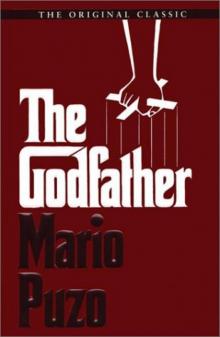 The Godfather
The Godfather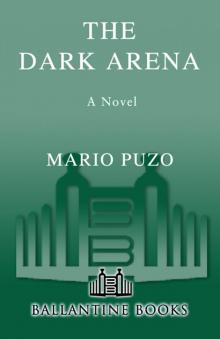 The Dark Arena
The Dark Arena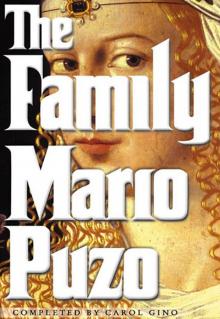 The Family
The Family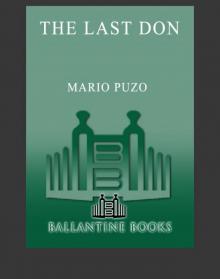 Last Don
Last Don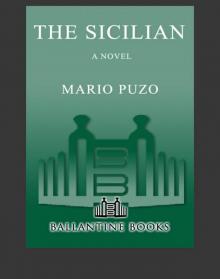 The Sicilian
The Sicilian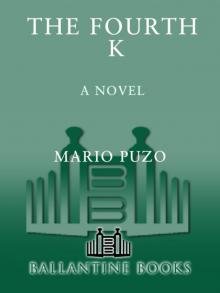 The Fourth K
The Fourth K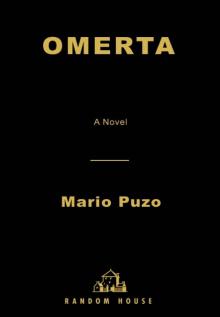 Omerta
Omerta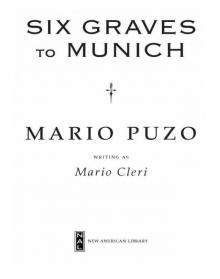 Six Graves to Munich
Six Graves to Munich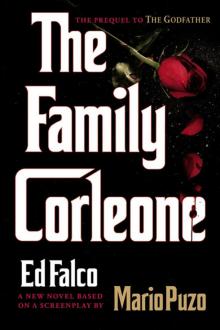 The Family Corleone
The Family Corleone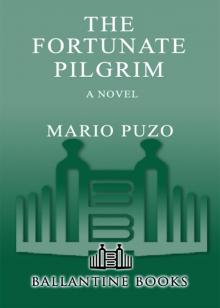 The Fortunate Pilgrim
The Fortunate Pilgrim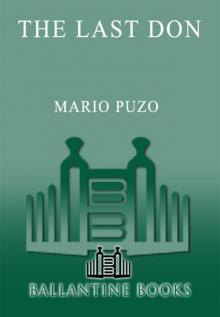 The Last Don
The Last Don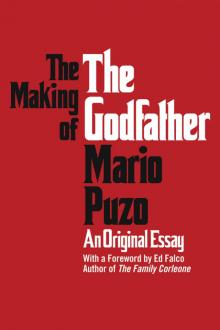 The Making of the Godfather
The Making of the Godfather Fools die
Fools die The Sicilian (v2.0)
The Sicilian (v2.0)